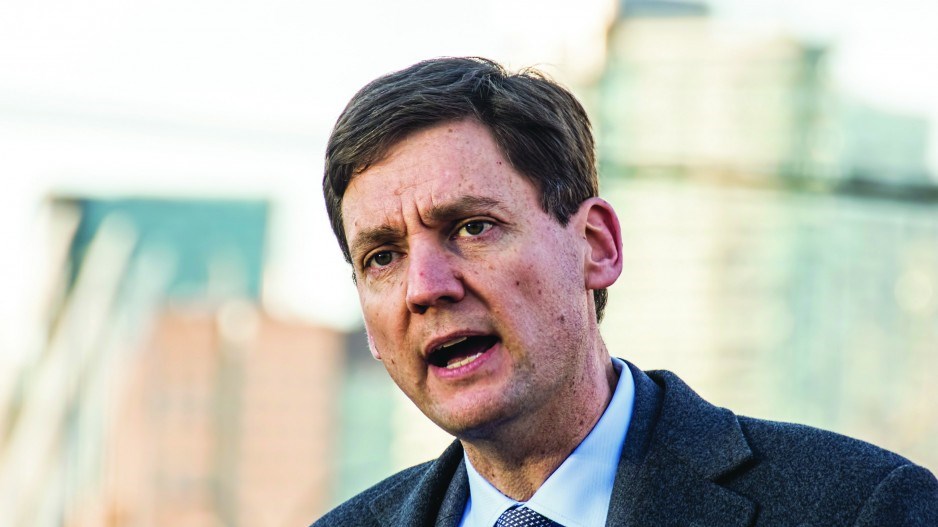Despite recognizing B.C.’s role as Canada’s economic gateway to the Asia-Pacific, the policy direction of government’s new cabinet under Premier David Eby appears to come up short in supporting that recognition with substance, one observer said.
Soon after Eby announced his cabinet in early December, he published mandate letters regarding each minister’s specific portfolio. Responsibility for trade falls largely on Jobs, Economic Development and Innovation Minister Brenda Bailey and State of Trade Minister Jagrup Brar – in addition to work by ministers covering specific industries like mining and forestry.
Eby’s missions for these ministers appear aligned on a key set of policy principles: Pushing more sustainable, environmental
exports in both tech and traditional resource sectors that focus on reconciliation with First Nations and spread economic benefits more evenly throughout the province.
“Building strong trade relationships will help protect British Columbia against uncertain global economic forces,” Eby wrote in his mandate letter to Brar, citing ongoing inflation, supply-chain bottlenecks and labour shortages. “Our province is already known for value-added resource commodities, clean and safe foods and manufactured goods, and game-changing services.
“Championing British Columbia beyond our borders – internationally and within Canada – means a continued focus on what we do well.… Through ambitious efforts to build new trade relationships and promote our high-tech sectors, we can bring made-in-B.C. goods and services to markets around the world, meeting the demand for clean, sustainable and responsibly produced products.”
Eby’s mandate letter to Bailey also broached the subject of B.C.’s role as “trade gateway to Canada” and urged the new minister to build competitiveness “through our environmental, social and governance advantages. From the West Coast of the United States to across Canada to around the world, people are interested in buying sustainable goods, products and services from B.C.”
Such ideals, said Carlo Dade, are understandable.
But the director of the Canada West Foundation’s Trade & Investment Centre pointed out that what is missing is recognition that B.C. also benefited from its role as the country’s Asia-Pacific Gateway, which generates revenue based on global demand for Canadian goods from other provinces moving through Vancouver and Prince Rupert as well as international goods moving from B.C. to other markets in North America.
As such, Dade concluded that the lack of specific initiatives to improve infrastructure under provincial authority to support cargo movement through B.C. ports is a glaring omission.
“The gateway makes money not just by shifting corn, cattle, canola and coal – and let’s mention coal, because B.C. is producing and shipping a lot of coal, and they don’t mention that – but also by pulling imports that are not, for the most part, being put on store shelves in Vancouver.”
Dade added that B.C.’s lack of focus on improving trade infrastructure is shortchanging its ability to capitalize on the economic benefits of being a gateway on one of the world’s most important trade routes.
“T he topic gets overlooked because it doesn’t attract the attention of voters, but it’s really damning that he [Eby] named three ministers who touch upon infrastructure – and yet completely ignore[d] it as part of trade. If you can’t move it, you can’t sell it; and that’s the message we’re getting from Asia. The lack of attention to this is a fundamental misunderstanding of the nature of the economy.”
He added that while the port authorities, railways and others fall under federal authority, a host of other key transportation projects like a Massey Tunnel replacement fall under the province’s responsibilities.
For his part, Eby recognizes the importance of engaging other jurisdictions in North America to assess what co-operation there could be with B.C.
In his letter to Brar, one of the key new items is a mandate to “build on relationships with B.C.’s neighbouring jurisdictions – including through the Pacific Coast Collaborative, the Pacific NorthWest Economic Region and interprovincial trade – to expand trade opportunities for B.C. businesses and support our shared efforts to reduce emissions.”
Incidentally, neither of the mandate letters to Bailey or Brar mentioned any other Canadian province by name. The documents touch only on “federal partnerships... on advancing priorities” beyond the mention of interprovincial trade.
“I realize this is a provincial mandate,” Dade said. “But it mentioned itself that B.C. is the gateway, not just for B.C., but for the country. It would have been really good to see some sort of recognition or acknowledgement of that, of working with provincial partners. Certainly, there was attention given to Cascadia – Seattle, Washington state, Oregon – but if I’m in the other parts
of Western Canada, like Alberta, Saskatchewan or Manitoba, I’m not feeling the love here.”
Dade pointed to other issues in Eby’s new B.C. trade policy, including:
■ No mentions of the need to physically visit the markets where the province wants to diversify trade; and
■ a lack of specifics on foreign-credential accreditation and the interprovincial and international movement of people as a solution to the labour crunch.
But Dade said the biggest disappointment in the mandate letters’ content from a trade perspective is the missing infrastructure piece to the puzzle – an oversight that could hamper B.C.’s effort to market its exports with a focus on corporate social responsibility (CSR).
“You can tell the CSR stuff all you want, but if people don’t think you can actually deliver the products, they are going to pat you on the back for being socially responsible – and buy from somebody who can actually get stuff to them.”



